
-
 President Museveni's son backs Ugandan strongman for 7th term
President Museveni's son backs Ugandan strongman for 7th term
-
Norris quickest as Verstappen bounces back in Singapore practice

-
 Wallabies lament All Blacks' fast start
Wallabies lament All Blacks' fast start
-
Germany's Oktoberfest opens under tight security after attacks

-
 Environmental protesters block French cruise liner port
Environmental protesters block French cruise liner port
-
Hezbollah in disarray after Israeli strike kills top commanders

-
 No place like home: Biden hosts 'Quad' leaders
No place like home: Biden hosts 'Quad' leaders
-
One dead, 7 missing as heavy rains trigger floods in central Japan
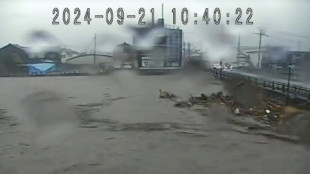
-
 Zelensky says no UK, US go-ahead to use long-range missiles
Zelensky says no UK, US go-ahead to use long-range missiles
-
New Zealand edge Australia 31-28 in Bledisloe Cup thriller

-
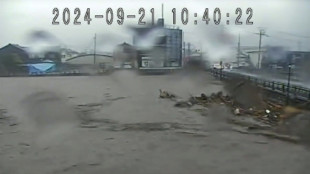 Japan orders evacuations as heavy rains trigger floods in quake-hit area
Japan orders evacuations as heavy rains trigger floods in quake-hit area
-
New Zealand pilot freed in Indonesia after 19 months in rebel captivity

-
 Hezbollah in disarray after Israeli air strike kills top commanders
Hezbollah in disarray after Israeli air strike kills top commanders
-
Leading climate activist released from Vietnam jail

-
 Ethiopians struggle with bitter pill of currency reform
Ethiopians struggle with bitter pill of currency reform
-
Sri Lanka votes in first poll since economic collapse

-
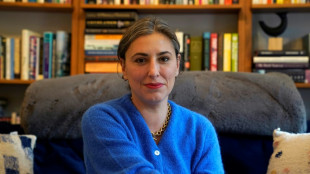 Feminist author warns of abortion disaster if Trump wins US election
Feminist author warns of abortion disaster if Trump wins US election
-
US city of Flint still reeling from water crisis, 10 years on
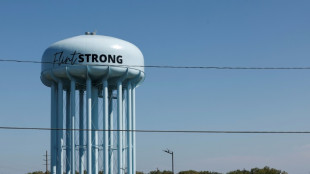
-
 Arsenal's mean defence faces acid test to shut out Man City again
Arsenal's mean defence faces acid test to shut out Man City again
-
Late surge lifts Thailand's Jeeno to LPGA Queen City lead

-
 DeChambeau says PGA's Ryder Cup decision 'just the start'
DeChambeau says PGA's Ryder Cup decision 'just the start'
-
Alcaraz defeated on Laver Cup debut

-
 Postecoglou embraces 'struggle' to make Spurs a success
Postecoglou embraces 'struggle' to make Spurs a success
-
Nice hand 'ashamed' Saint-Etienne 8-0 Ligue 1 mauling

-
 Boeing CEO says ending strike 'a top priority'
Boeing CEO says ending strike 'a top priority'
-
Stock markets mostly fall after Fed-fueled rally

-
 Harris slams Trump for hypocrisy on abortion as US starts voting
Harris slams Trump for hypocrisy on abortion as US starts voting
-
Academy to host first overseas ceremony to honor young filmmakers

-
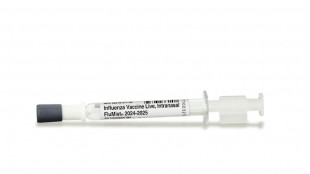 No doctor necessary: US okays nasal spray flu vaccine for self-use
No doctor necessary: US okays nasal spray flu vaccine for self-use
-
Gurbaz, birthday boy Rashid lead Afghanistan to 177-run rout of South Africa

-
 Former delivery man Baldwin leads star names at PGA Championship
Former delivery man Baldwin leads star names at PGA Championship
-
Trump shooting: Secret Service admits complacency

-
 Can an ambitious Milei make Argentina an AI giant?
Can an ambitious Milei make Argentina an AI giant?
-
Haiti, its suffering growing, in 'race against time': UN expert

-
 Ibrahim Aqil, the Hezbollah elite unit commander wanted by the US
Ibrahim Aqil, the Hezbollah elite unit commander wanted by the US
-
Chinese forward Cui signs NBA contract with Brooklyn Nets

-
 US Fed dissenter calls for 'measured' pace of rate cuts
US Fed dissenter calls for 'measured' pace of rate cuts
-
Guardiola tells players to lead change over workload as Kompany demands cap on games

-
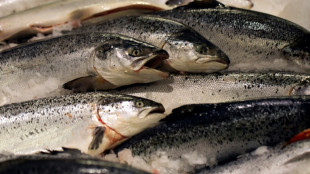 Norway limits wild salmon fishing as stocks hit new lows
Norway limits wild salmon fishing as stocks hit new lows
-
Top Hezbollah commander killed in Israeli strike on Beirut

-
 Rotterdam fatal knife attacker suspected of 'terrorist motive'
Rotterdam fatal knife attacker suspected of 'terrorist motive'
-
First early votes cast in knife-edge US presidential election

-
 Top-ranked Swiatek out of Beijing due to 'personal matters'
Top-ranked Swiatek out of Beijing due to 'personal matters'
-
Hard-right Reform UK looks to the future after vote success

-
 Embiid agrees to NBA contract extension with 76ers
Embiid agrees to NBA contract extension with 76ers
-
Joshua aims to complete road to redemption in Dubois bout

-
 World champion Bagnaia sets pace with lap record at Misano
World champion Bagnaia sets pace with lap record at Misano
-
Biden says 'working' to get people back to homes on Israel-Lebanon border

-
 Pope criticises Argentina's crackdown on protesters
Pope criticises Argentina's crackdown on protesters
-
Court limits screenings of videos in France mass rape case


Hezbollah in disarray after Israeli strike kills top commanders
Hezbollah was in turmoil Saturday after Israel took out two leaders of its elite operations unit in a strike on a command meeting in a Beirut stronghold that Lebanese authorities said killed 31 people.
Lebanese Health Minister Firass Abiad said three children were among the dead in Friday's strike on an underground meeting room, which AFP journalists said left a huge crater in a densely populated neighbourhood of the capital's southern suburbs.
Israel said the strike killed the head of Hezbollah's elite Radwan Force, Ibrahim Aqil, and several other commanders.
Abiad said emergency services worked "through the night" to recover dead and wounded from the debris, adding that "a residential building collapsed on top of occupants" after the Israeli attack.
The Radwan Force has spearheaded Hezbollah's ground operations, and Israel has repeatedly demanded through international mediators that its fighters be pushed back from the border.
Coming hot on the heels of sabotage attacks on communications devices this week that killed 37 people in Hezbollah strongholds, the strike raised new questions about the Iran-backed group's security arrangements and dealt a heavy blow to its fighters' morale.
Hezbollah said a second senior commander was also killed, naming him as Ahmed Mahmud Wahbi, head of the group's operations against Israel from the onset of the Gaza war in October until the start of this year.
Confirming the death of Aqil, who was wanted by the United States for involvement in the 1983 bombing of the US embassy in Beirut, Hezbollah hailed him as "one of its great leaders".
It was the second Israeli strike on the Hezbollah military leadership since the start of the Gaza war. An Israeli strike on Beirut in July killed Fuad Shukr, a top operations chief for the movement.
It also followed sabotage attacks on pagers and two-way radios used by Hezbollah on Tuesday and Wednesday, which killed 37 people and raised fears of a wider war.
Stephane Dujarric, spokesman for UN Secretary-General Antonio Guterres, said the world body was "very concerned about the heightened escalation" and called for "maximum restraint" from all sides.
The Israeli military said it conducted a "targeted strike" against Aqil, which a source close to Hezbollah said killed a total of 16 Radwan Force members.
"The command of the Radwan Force was meeting in the basement of the building," the source said.
AFP journalists said the strike gutted the lower floors of the tower block.
The United States had offered a $7 million reward for information on Aqil, describing him as a "principal member" of an organisation that claimed the 1983 embassy bombing, which killed 63 people.
- Spearhead -
Israeli troops and Hezbollah fighters have battled each other along the Israel-Lebanon border since Hamas militants triggered the war in Gaza with their October 7 attack.
The focus of Israel's firepower for nearly a year has been on Gaza, but with Hamas much weakened, that focus has now moved to Israel's northern border.
Defence Minister Yoav Gallant said Israel's "enemies" would find no refuge, not even in Beirut's southern suburbs.
Military spokesman Daniel Hagari said Israel was "not aiming for a broad escalation in the region".
But Hamas called it a "brutal and terrorist aggression" and an "escalation".
Iran's foreign ministry accused Israel of seeking to "broaden the geography of the war".
Months of near-daily cross-border exchanges have killed hundreds in Lebanon, mostly fighters, and dozens in Israel, forcing tens of thousands on both sides to flee their homes.
The latest blow to Hezbollah came after thousands of Hezbollah operatives' pagers and walkie-talkies exploded over two days, killing 37 people and wounding thousands.
Hezbollah chief Hassan Nasrallah vowed Thursday that Israel would face retribution for those blasts.
Before Friday's Beirut strike, Israel said Hezbollah had fired dozens of rockets from Lebanon following air attacks that destroyed dozens of the militant group's launchers.
Gallant told troops on Wednesday that "Hezbollah will pay an increasing price" as Israel tries to "ensure the safe return" of its citizens to border areas.
"We are at the start of a new phase in the war," he said.
- 'Fear of wider war' -
Israeli Prime Minister Benjamin Netanyahu delayed by a day his scheduled departure to the United States, where he is due to address the UN General Assembly.
On Friday the UN's High Commissioner for Human Rights, Volker Turk, told the Security Council the attack on Hezbollah communications devices violated international law and could constitute a war crime.
The pagers and walkie-talkies exploded as their users were shopping in supermarkets, walking on streets and attending funerals, plunging Lebanon into panic.
"I am appalled by the breadth and impact of the attacks," said Turk, adding that it "is a war crime to commit violence intended to spread terror among civilians".
International mediators, including the United States, have been scrambling to stop the Gaza war from becoming an all-out regional conflict.
Hamas's October 7 attacks that sparked the war resulted in the deaths of 1,205 people, mostly civilians, on the Israeli side, according to an AFP tally based on Israeli official figures that include hostages killed in captivity.
Israel's retaliatory military offensive has killed at least 41,272 people in Gaza, most of them civilians, according to figures provided by the Hamas-run territory's health ministry. The United Nations has acknowledged the figures as reliable.
burs/kir/srm
M.Ouellet--BTB
